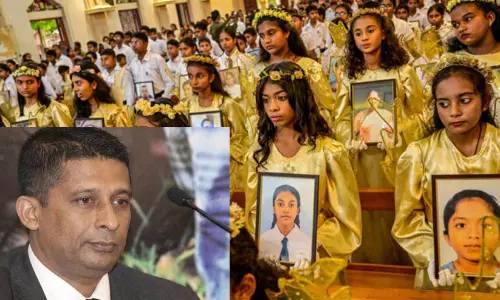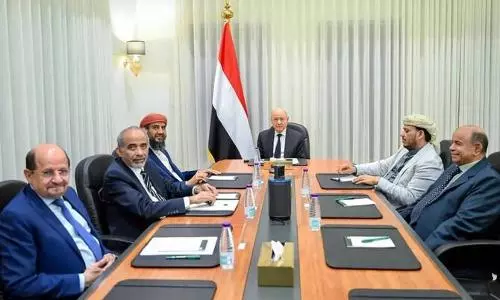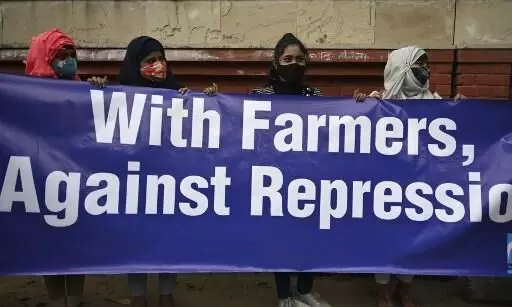
Farmers union thanks international celebrities for support
text_fieldsDemonstrators take part in a march organised in support of farmers protesting against the central government’s recent agricultural reforms in New Delhi on February 3, 2021.
New Delhi: The Samyukt Kisan Morcha, the umbrella body of more than forty farmer unions who are protesting against recently passed agriculture laws, has thanked the international celebrities for talking about the issue.
Darshan Pal, Dr Darshan Pal, president of Krantikari Kisan Union-Punjab, said that the Morcha is proud that people acknowledge the issues that affect food & lives.
However, he expressed the disappointment over the callousness of the Government of India "which is not understanding the pain of the farmers".
"It is a matter of pride that eminent personalities across the globe are showing sensitivity towards the cause, while on the other hand, it is sad that the government of India is not understanding the pain of the farmers and some people are even calling the peaceful farmers as terrorists.
Tweets of international personalities particularly by pop singer Rihanna, child environmentalist Greta Thunberg and Menra Harris, helped to draw international attention towards the protest which has been continuing for more than two months.
A Twitter frenzy broke out on Wednesday when American pop singer Rihanna on Tuesday night posted a news link on India's farmers' protest and tweeted, "why aren't we talking about this?!" It triggered widespread outrage from Indians questioning Rihanna's credentials and knowledge about India's internal matters.
This was followed by Greta Thunberg, the celebrity teenager famous for her environmental activism, tweeting, "We stand in solidarity with the #FarmersProtest in India."
Meena Harris on Wednesday morning participated in the coordinated attack on India. "It's no coincidence that the world's oldest democracy was attacked not even a month ago, and as we speak, the most populous democracy is under assault. This is related. We all should be outraged by India's internet shutdowns and paramilitary violence against farmer protesters," she tweeted.
Lebanese-American actress Mia Khalifa also joined the bandwagon by posting a picture of Indian women protesters with a comment, "What in the human rights violations is going on?! They cut the internet around New Delhi?! #FarmersProtest"
While their tweets got hundreds of likes and retweets from around the world, a few Indian right wing twitter handles were obviously offended over the messages.
The ministry of external affairs was forced to issue a statement lashing out at the celebrities. "Before rushing to comment on such matters, we would urge that the facts be ascertained, and a proper understanding of the issues at hand be undertaken. The temptation of sensationalist social media hashtags and comments, especially when resorted to by celebrities and others, is neither accurate nor responsible," the statement said.
The Parliament of India, after a full debate and discussion, passed reformist legislation relating to the agricultural sector, the government explained. "These reforms give expanded market access and provided greater flexibility to farmers. They also pave the way for economically and ecologically sustainable farming."
The government said that a very small section of farmers in parts of India has some reservations about these reforms. "Respecting the sentiments of the protesters, the Government of India has initiated a series of talks with their representatives. Union Ministers have been part of the negotiations, and eleven rounds of talks have already been held. The Government has even offered to keep the laws on hold, an offer iterated by no less than the Prime Minister of India."
It is pertinent to recall that the protesting farmers have several times challenged the government of India to produce evidence for the claim that the laws were brought in after due consultation with the farmers.
The laws were hastily passed in the Lok Sabha, with minimal discussion and denied the opposition demand to send the bills to the Parliamentary Committee for consultation, and taken to the Rajya Sabha.
In the Upper House, where the ruling party does not have a simple majority, the Speaker passed the laws using a voice vote, without actually counting to see if they had sufficient votes.























